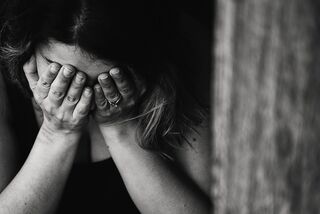Personality
Do You Have a "Future-Anxious" Personality Type?
Understanding anxiety about the future is especially important during Covid-19.
Posted November 17, 2020 Reviewed by Abigail Fagan

Anxiety has the unique ability to transcend time. We worry about things in our past and present as much as we worry about our future.
How do you know if you have a "future-anxious" personality type? A new paper published in the journal Personality and Individual Differences suggests there are two ways to find out.
The first is straightforward. Answer the six questions below on a scale of 1 (strongly disagree) to 7 (strongly agree) and add up your results. Scores above 30 suggest you are on the higher end of the future-anxiety spectrum while scores below 30 suggest you are on the lower end.
- I am afraid that the problems which trouble me now will continue for a long time.
- I am uneasy about possible mishaps.
- I am afraid that changes in the economic-political situation will threaten my future.
- I am afraid that the health-care system situation will threaten my future.
- I am disturbed by the possibility of a serious illness.
- I fear I will fail to overcome mounting difficulties.
There is, however, a second way to tell if you have heightened levels of future anxiety. This has to do with the degree to which you view Covid-19 as a serious threat. Individuals who are more conscious of the severity, spread, and impact of the pandemic are more likely to exhibit future anxiety. They are also more likely to show significant drops in their well-being as a result of the pandemic.
This is according to an online survey of 711 adults, ages 18 to 49, fielded between June 15th and June 20th, 2020. The region in which the data collection took place was not disclosed by the researchers, but they noted that it occurred one week after a sweeping government lockdown was initiated.
“The pandemic's perceived threat generates uncertainty and fear, increasing stress and vulnerability, which, in turn, has a detrimental impact on subjective mental well-being,” state the researchers, led by Mario Paredes of the Del Rosario University in Colombia. “Furthermore, the mediating effect of future anxiety provides evidence on how the perceived threat also activates individuals' worries for their future situation, leading to the experience of negative perceptions about future consequences.”
Fortunately, the researchers found one key personality dimension that has the ability to break the cycle of anixety. Individuals with higher psychological resilience, or the ability to adapt to adverse conditions, were less likely to exhibit heightened levels of future anxiety during the crisis regardless of whether they perceived the threat of Covid-19 to be large or small.
This invites a final question: how do you know if you have high psychological resilience? Again, the scale below can help. Rate how well each of the nine statements below fits your personality on a scale of 1 (not at all) to 7 (extremely so) and add up your results. Scores above 44 indicate you have high psychological resilience while scores below 44 suggest you have low psychological resilience.
- Able to adapt to change
- Past success gives confidence for new challenges
- See the humorous side of things
- When things look hopeless, I don't give up
- Not easily discouraged by failure
- Think of yourself as a strong person
- In control of your life
- I like challenges
- You work to attain your goals
Regardless of how you scored on the scale above, we can all do things to improve our psychological resilience. The authors write, “The literature has identified different strategies to strengthen individual resilience. For instance, there is evidence that mindfulness as a trait — the disposition to pay attention to the present moment — positively links with resilience. This mindfulness trait can be increased through mindfulness-based interventions, leading to mental health benefits ... In addition, there is also evidence that exercise, better sleep, and spiritual health also enhance resilience.”
References
Paredes, M. R., Apaolaza, V., Fernandez-Robin, C., Hartmann, P., & Yañez-Martinez, D. (2020). The impact of the COVID-19 pandemic on subjective mental well-being: The interplay of perceived threat, future anxiety and resilience. Personality and Individual Differences, 110455.


